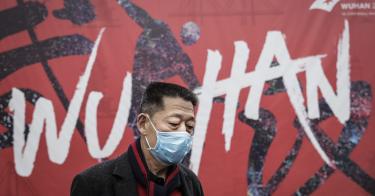The Trump administration’s response to the coronavirus outbreak thus far has been robust as the disease that originated in Wuhan, China, spreads across the world.
Through a combination of travel restrictions, quarantines, and keeping the public informed on the best public hygiene practices, the administration has focused on slowing the entry of the disease into the United States and then containing it.
Thus far, the disease has infected more than 96,000 people worldwide, across some 80 countries—and at least 163 Americans in 18 U.S. states.
While the number of cases of the 2019 novel coronavirus in the United States remains quite small compared with the global count, there are concerns about “community spread,” where the virus that causes the coronavirus disease (COVID-19) may be moving undetected person-to-person.
With the disease that originated in China in December begins to spread in the U.S., getting our COVID-19 response right is of the utmost importance.
As coronavirus testing capacity grows, the number of cases that are detected will likely increase.
The seriousness of the disease should not be understated: Major complications and death are certainly possible. Based on current projections, however, a significant majority of those infected with COVID-19 will only experience mild-to-moderate flu symptoms.
Fortunately for Americans, the U.S. health care system is considered the best in the world. A 2019 Global Health Security Index recently ranked it as the top country out of 195 countries evaluated.
Given the strength of America’s health care system, the U.S. is comparatively well-positioned when it comes to responding to the COVID-19 epidemic.
More work remains ahead to prevent and respond to the epidemic within American borders. The Trump administration is on the right path, but all levels of government, in concert with the private sector, must:
Produce and distribute diagnostic-testing capability to states and localities as quickly as possible. Identifying those infected, then treating and isolating them, is critical to containing any outbreak and to further understanding the virus.
Develop vaccines and therapeutics. This is a difficult and time-consuming process, but finding treatments and preventative measures for this outbreak—which may last well beyond the current influenza season—is clearly an essential step for this epidemic and the next.
Conduct continuous public outreach. U.S. officials must continue to update the American people on the state of the outbreak here and abroad while publicizing best hygiene practices. Disseminating information is fundamental to helping people make wise personal choices that can protect themselves and others.
Shore up U.S. health care system preparedness. Responding to an outbreak, such as the flu, places immense stress on any health care system, even one as good as that of the United States.
The administration is working with Congress to appropriate billions in emergency funding, and of that, sufficient funding must be directed toward strengthening health care systems at the state and local levels, where much of this battle will be fought.
Policymakers must also address potential health care supply chain concerns, ensuring that medical personnel protective equipment and imported drugs and pharmaceutical active ingredients are available for those who need them as we fight this epidemic.
Set aside political partisanship during the epidemic. It should go without saying, but this is the time for national unity in responding to the COVID-19 outbreak—not for playing politics with public health. Too much is at stake.
Accordingly, Congress should prioritize the administration’s request for additional funding to handle the coronavirus epidemic. Any supplemental spending bills must be free of amendments unrelated to fighting the coronavirus, which could potentially delay its passage and divert much-needed resources.
The Trump administration has taken decisive steps so far in addressing the COVID-19 crisis, such as restricting certain international travel. But a sustained campaign of care and communication will be needed to fight this new form of infectious disease.
This piece originally appeared in The Daily Signal



